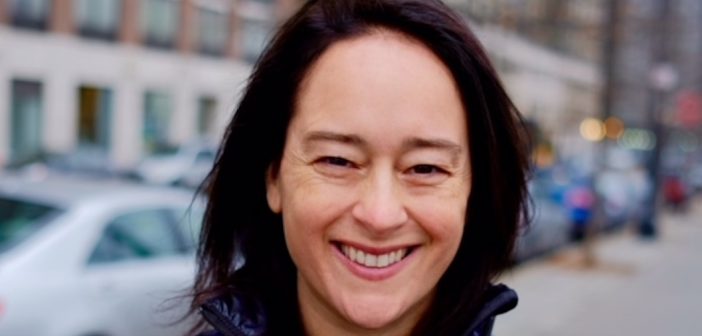Heather Gautney’s book, The New Power Elite, doesn’t have a happy ending.
“We’re in trouble,” she concludes about the political, economic, and cultural state of America today.
But that’s not to say she doesn’t see opportunities for the country to reverse course. “I’m very hopeful with young people, and our students in particular,” said Gautney, an associate professor of sociology at Fordham’s Lincoln Center campus.
The book, published by Oxford University Press this month, is billed as a companion piece to C. Wright Mills’ iconic The Power Elite (Oxford University Press,1956), which Gautney says drew back the curtain on the belief that 1950s America was a bastion of democracy. Her goal in writing a sequel of sorts was to “hopefully provide some explanation for how we got to this place with Trump, January 6th, and all this political unrest.”
Mills wrote at a time when inequality was at its lowest and there was consensus that America was the best of all countries. He argued that in reality America was more authoritarian, with a consortium of corporate, political, and military elites, driven by greed, holding all the power and manipulating public opinion. Mills warned of “the military industrial complex,” a term made famous by President Dwight D. Eisenhower in his farewell speech. Mills also has been cited as an inspiration for the 1960s counterculture, Gautney said.
Such sweeping analyses are rarely written these days, which is a part of why she felt compelled to pick up where Mills left off. “It’s a lack of historical memory that is how we got where we are. I had our Fordham students in mind. They are so smart, but [because they’re young]they don’t have the historical references.”
Gautney has personal experience in politics at a high level: she was a senior policy advisor for Bernie Sanders’ presidential campaign and served as an advisor in his Senate office and as co-chair of the Biden-Sanders Unity Task Force on Education. She also has connections to the film industry, in which her husband works. She says both have opened her eyes to how things really work.
The country now has enormous wealth in the hands of a few who are able to control policy through their billions, Gautney said, and political institutions and the military have been largely subordinated to the corporate sphere. Couple that with the merging of politics and celebrity, and America is fundamentally undemocratic, she argued.
“Celebrity has become a huge corporate conglomerate,” she said. “Now we have celebrities who wield corporate power and are billionaires.”
Mills wrote of the manipulative posturing of mass media. Gautney says today it’s far worse. “Fox News can make a president now, obviously. It feels like it is an institution that is so far gone, and yet it is so fundamental.”
“It’s Chapter 1 in the authoritarian playbook—manipulating thought,” she said.
Gautney has some ideas for what can be done and hasn’t lost hope, even though she didn’t conclude the book that way. “It would be trivializing to try to summarize how to reverse course,” she said.
She did, however, share some of her thoughts for change in an interview. “Reclaiming the media: setting standards and decommodifying it. We need to start to recognize that certain things should be public goods, like health care and education. They cannot be accessible to only certain strata,” she says.
The way to accomplish all that is by creating and fostering spaces for thinking about systemic changes and how to separate the influence of money, said Gautney. “It is the job of academics to think of alternatives at a broad level.”
She believes students are coming in more well-read and publicly engaged nowadays, but they tend to be engaged more locally—in issues such as the environment or race issues. Building solidarity with other movements is imperative, she said. “You can’t afford to silo and diffuse this power. Young people interested in change need to bring in other groups. That’s vital.”
Fordham’s service learning initiatives, Gautney believes, are valuable for exposing students to experiences different than the ones they inhabit, which is also key.
“Then you have potential for big impacts,” she said. “That’s how the world changes.”



